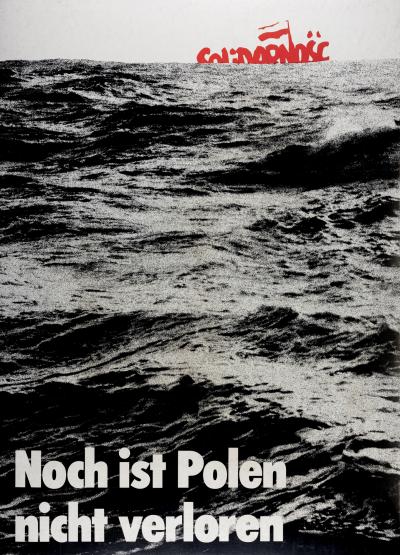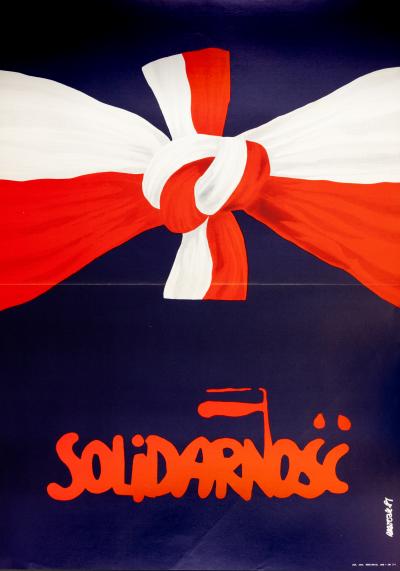Bodo Hombach: “Poland is down but not out”, 1982

On 9 March 1982, in my position as Executive of SPD-NRW, I wrote to all elected officials in North Rhine-Westphalia. In the letter, I announced that an exhibition entitled “Spuren des Freiheitswillens” [“Signs of the desire for freedom”] would be opened on 12 March 1982 in the offices of the SPD regional office for NRW. The exhibition showed posters, flyers, forbidden literature, photos and other materials of the Polish Solidarność movement. Also on 12 March 1982, I introduced to the public the portfolio of posters “Poland is down but not out” that had been published by the Heidelberger graphic artist Klaus Staeck and myself. In the circular, I gave notice that Solidarność activists would be meeting in Düsseldorf on 13 and 14 March 1982. I had organised this meeting with the German Trade Union Association.
After the meeting on 15 March 1982, I held a press conference with representatives of the Solidarność movement in the exhibition rooms. The dpa communication based on this stated that: “In his cover letter, the SPD General Secretary Bodo Hombach appealed to the party officials: ‘Display these posters, make them accessible to many, make a political demonstration out of them’. At the opening of the Düsseldorf exhibition, he went on to say that his SPD Regional Association had collected 250 addresses of Polish families whose fathers were interned and who desperately needed help. The SPD would now organise sponsorships. The works council at the Mannesmann Röhrenwerke had already taken over the sponsorships of 50 families.”
Poster collection
After its public presentation, the poster collection was sent to all local SPD associations in NRW. The SPD aimed to express their solidarity with the Solidarność activists through campaigns based on local activities and exhibitions. The following quotes came from a circular that I sent to the elected officials:
“… German social democracy is always on the side of freedom. This is also documented by the North Rhine-Westphalian SPD with an exhibition of Polish trade union posters, flyers, forbidden literature, photos and other ‘signs of the desire for freedom’. The exhibition should extend across the country. This portfolio with its collection of important posters of the Solidarność movement will be used to achieve this goal. The prints are authentic, right up to the quality of the paper. That is why, for example, the reproduction of one of the first posters ever published by Solidarność is also printed on packing paper.
I implore you: Display these posters, make them accessible to many, make a political demonstration out of them, sell as many portfolios as possible. All the profits will be used for the benefit of Solidarność. …
We would like to thank those who have helped make the poster portfolio possible: Above all our thanks go to the graphic artist Klaus Staeck and his friend Gerhard Steidl. They are responsible for the typographical design of the portfolio and declined to take a fee. …”
Acquiring the posters
With the help of a German diplomat, I was able to bring most of the posters we used back with me from Poland on my various trips, during which I was able to observe Solidarność activities and to speak with activists. The actions of the Regional Association of North Rhine-Westphalia, which Johannes Rau was across, were viewed critically and commented on by political realists within the federal SPD. Nevertheless, the NRW SPD implemented the campaign in a number of places and mobilised funds to support the Solidarność movement and the families of those who had been interned.
Bodo Hombach, March 2021
Poland is down but not out
41 reprinted Polish posters (1980-1981) and a poster by Klaus Staeck
Published by Klaus Staeck and Bodo Hombach with a foreword by Johannes Rau
Reproduction and printing: Gerhard Steidl, Göttingen
Publisher: Edition Staeck in cooperation with the SPD Regional Association of North Rhine-Westphalia





































